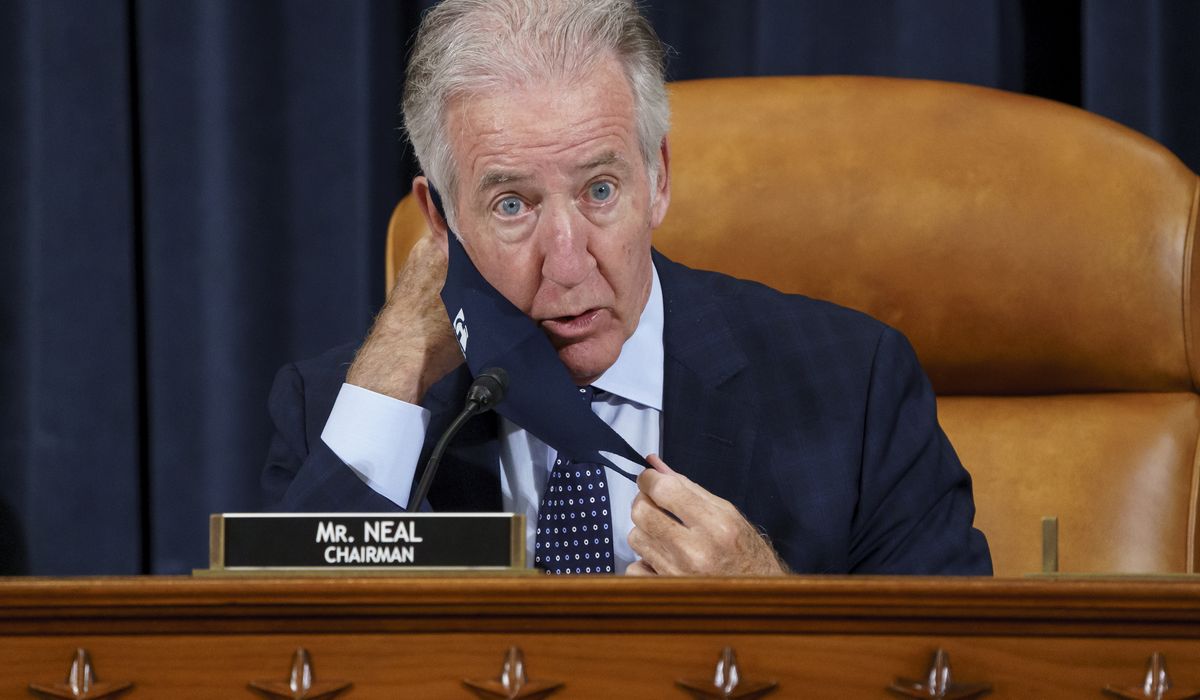
Democrats, who are scrambling to raise revenue for President Biden’s unfinished $2 trillion social welfare plan, managed to find a tax hike that even fellow Democrats don’t like.
Senate Democrats’ latest plan — which was being released late Tuesday night — is a proposed tax on billionaires, which opponents warn would decimate the stock market, drive the nation’s most successful entrepreneurs out of the U.S. and eventually hit less-wealthy taxpayers.
Some of that opposition comes from lawmakers such as Rep. Richard E. Neal, Massachusetts Democrat and chairman of the tax-writing House Ways and Means Committee. He said implementing a tax increase on billionaires’ “unrealized” gains in stocks and other assets “will be a challenge.”
“If you have a bad year, how do we do it?” Mr. Neal said. “All the proposals that I’ve seen so far not only don’t simplify the tax code, they make it more complicated.”
Senate Finance Committee Chairman Ron Wyden, Oregon Democrat, introduced the fine print of the proposal calling for taxing the liquid assets of roughly 700 billionaires, the wealthiest 0.0005% of Americans.
“This is a billionaire’s income tax,” Mr. Wyden told reporters Tuesday. “It’s not a wealth tax. I’ve always felt that success was giving everybody in America the chance to get ahead. And what we’re dealing with is flagrant loopholes in the tax code.”
The tax would apply solely to people with at least $1 billion in assets or $100 million in income for three straight years.
Billionaires would pay a tax on tradeable items such as stocks even if they hold on to the asset. They would be taxed on any increases in value and take deductions on losses. Under current law, those assets are taxed only when they are sold or a profit is realized.
House Speaker Nancy Pelosi, California Democrat, estimated that the plan would raise $200 billion to $250 billion over 10 years, far short of the total needed to pay for Mr. Biden’s “social infrastructure” package.
Treasury Secretary Janet Yellen said the tax “would help get at capital gains, which are an extraordinarily large part of the incomes of the wealthiest individuals and right now escape taxation until they’re realized.”
House Budget Committee Chairman John A. Yarmuth, Kentucky Democrat, said he is concerned that the plan wouldn’t generate consistent annual revenue like an income tax increase on marginal rates.
“To think of it as a revenue raiser, you’re trying to predict the stock market,” he told reporters.
Republicans say the proposal is a half-baked rush job that would have unintended negative consequences.
Sen. Mitt Romney, Utah Republican, said Democrats haven’t thought out the impact of their proposal. Some predicted that billionaires would move money into assets for which annual appreciation is difficult to calculate, such as artwork.
“You’ll get billionaires taking their money out of job creation [in the stock market] and putting into assets that don’t create jobs. That’s a bad idea,” Mr. Romney said. “I don’t want to raise taxes at all, but it’s a lot safer to do something on a marginal basis in the current tax code than to come up with a new way of taxing people that has unintended consequences.”
Rep. Kevin Brady of Texas, the top Republican on the Ways and Means Committee, said France abandoned a similar tax in 2018 after finding that it discouraged investors from spending on projects that create jobs.
“If a country like France has learned the lesson that a wealth tax hurts their economic growth and their investment in their local economies, why would America even go down that road?” Mr. Brady said Tuesday. “It’s impossible to implement [and] likely unconstitutional.”
The Constitution says taxes “shall be … in Proportion to the Census.” In other words, all federal taxes must be geographically uniform, but direct taxes must be apportioned.
Joe Bishop-Henchman of the National Taxpayers Union Foundation argued in a report this week that legal precedent indicates a wealth tax is unconstitutional.
“It is a direct tax within the meaning of the Constitution, and its enactment without apportionment would be unconstitutional,” he wrote.
Democrats arrived at this point because Sen. Kyrsten Sinema, Arizona Democrat, opposed a House-passed plan to raise taxes on corporations, capital gains and taxpayers earning more than $400,000 per year. That proposal was expected to raise about $850 billion.
As one of 50 Democrats in the evenly divided Senate, Ms. Sinema would be needed to pass any tax plan.
Mr. Neal said he explained to Ms. Sinema his alternative proposal for a 3% surcharge on income over $5 million, but he got no reaction from her. He said the House-passed tax plan benefits from “efficiency and predictability” and expressed frustration at having to mollify Senate Democrats.
“We’re all of a sudden not talking about a plan that’s been vetted and passed; we’re talking about the objections of a couple of people,” he said in an apparent reference to Ms. Sinema and Sen. Joe Manchin III, West Virginia Democrat.
Another proposal unveiled Tuesday night would impose a “minimum book tax” of 15% on corporations that report at least $1 billion in profits over three years. It would raise more than $300 billion over a decade and has the backing of Ms. Sinema.
Sen. Elizabeth Warren, a Massachusetts Democrat whose 2019 bill is the model for the billionaire’s tax, said the U.S. must change its tax laws to restore fairness.
“From all that’s going on right now, it is not right when Amazon reports $10 billion in profits and pays nothing in taxes,” she said. “It is not right when Jeff Bezos sits on a mountain of money bigger than Mount Everest and pays only on the $83,000 in income. Americans understand that our tax system is rigged. And this is our chance to fix it.”
• This article is based in part on wire service reports.
